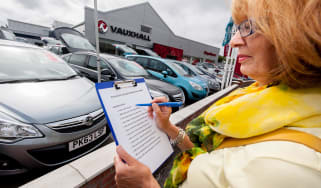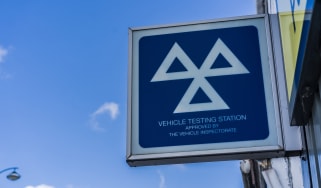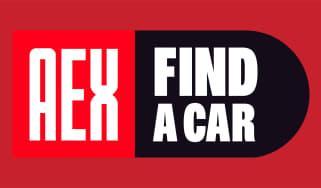The secrets of getting the best part exchange price for your car
If you’re thinking of buying a new car and using your old one as part exchange, this is the guide for you…
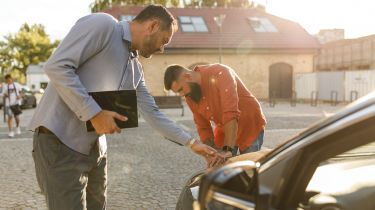
If you’re buying a new car there’s a good chance that you’ll also have an old car to get rid of. Part exchanging that old car against the new one is probably the easiest way of doing exactly that.
Part exchange means that you're exchanging your old car for part of the cost of your new one. The dealer will decide exactly how big that part of the new car price is by valuing your old car and making you an offer for it. You’ll want to make sure that you get the best possible price but the convenience of part exchanging your old car as part of the new car transaction is the main appeal, you probably won’t get as good a price as you would by selling it privately or using an online car buying service.
In this guide, we’re going to look at car part exchange deals in detail, explaining the advantages and disadvantages of taking the part exchange route in order to sell your car, how to get the best price from the dealer and lots of other important things you need to know when entering into a part exchange agreement.
How does part exchange work?
Part exchange a simple concept. Instead of buying your car outright for cash or getting it on finance, you use the value of your old car to make up part of the deal.
Most car dealers will offer to take your old car in part exchange when you buy a new one. They’ll take a look at your old car and make you an offer for it. This will be on the understanding that you will use that money to go towards the cash price of your new car, or to pay part of the deposit on a finance deal.
Part exchange is an easy way of building the disposal of your old car into the deal for your new one. By doing this there are no other parties involved and the process should be more straightforward. You just drive your old car to the showroom, complete the paperwork and drive home in your new one.
How do dealers value part exchange cars?
The big question when it comes to part exchange is how much your old car is worth. A dealer taking-in a part exchange car will be looking to sell it on at a profit, that might be to customers at their own showroom, to another dealer or through a car auction. It’s in their interests to give you a low offer to increase their potential profit margin.
How much you get when you part exchange a car will depend on a number of factors but the offer will be a ‘trade’ price and not the kind of money you would expect to pay as a consumer looking to buy a similar car. Lots of factors determine a car’s value from its specification and service history to its condition and mileage, but the dealer will also be assessing how easy the car will be for them to move on. If it’s the kind of vehicle that the dealer sells at their dealership, you may get a slightly better price than if it’s something they don’t have a ready stream of customers for.
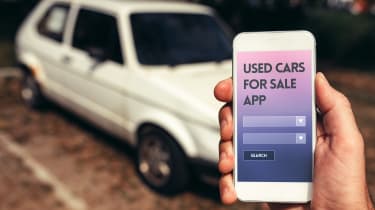
Car valuation tools and calculators can give you an idea of the value of your car but don’t confuse part-exchange or trade values with values for cars selling privately or at dealerships because the difference can be significant. Dealers will have their own valuation guides that they work from and they may offer more or less depending on how easy they think the car will be for them to sell at a profit but valuation tools will generally give you an accurate idea of how much you can expect to get.
If a part-exchange offer from a dealer seems particularly low, you could always get another valuation from another dealer or look to the various online car selling services that will make you an offer for your car based on your description and photographs. We’ll explore these other options for selling a car when we look at alternatives to part-exchange below.
Can you negotiate on part exchange prices?
Remember that the dealer’s part exchange offer is exactly that, an offer. There is always room for negotiation on car prices and the terms of the deal and driving a hard bargain might be necessary. One issue with the part exchange route to selling your old car is that it can become quite complicated when there’s a finance deal involved on the new car you’re buying. The part exchange value becomes integral to the whole deal in this instance, potentially affecting the size of the deposit and having a knock-on effect on the monthly payments.
We would always recommend a bit of haggling though. You’ll be asked how much you want for the car and it will pay to have done a bit of research into the car’s value. Go in a little higher than what the valuation tools suggest the car is worth as a part exchange, that’ll be a good starting point to your negotiations.
Should you prepare your car before part exchanging it?
Getting a better part exchange price on your old car is going to make your new car more affordable, it might even mean that you can afford a better car than you thought. On that basis, taking steps to get the best possible part exchange price does make sense but that always needs to be weighed-up against the time, money and effort you might spend fixing the car up.
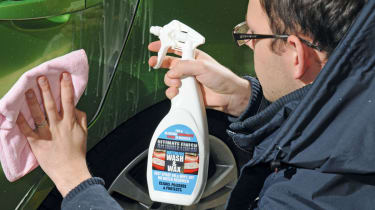
Dealers will try to ‘chip’ away at the value of your car by noting imperfections but the attraction of part exchange is the simplicity. If you’re going to go to great expense fixing dents and scratches you may get more of that money back by selling the car privately or through an online car buying service. Because the part exchange offer is likely to be a little lower anyway, our advice would be to look after the basics and not go to town returning your car to showroom condition.
What are these basics? Well, make sure that you have all the correct documents (more on those below) and that any accessories or detachable items that came with the car are in place, we’re talking about locking wheel nut keys, spare ignition keys, parcel shelves, floor mats - that kind of thing. Give the car a good clean inside and out as well, just to show it in its best light when the dealer makes their inspection.
If there’s only a month or so left on the car’s MoT, however, you can expect to have the price knocked down - especially if things like broken lights or worn tyres suggest that money will have to be spent on the car if it’s going to pass.
Going further than that by getting new services carried out or fixing cosmetic damage may not be as worthwhile for a part-exchange as it would be in a private sale. Dealers will have the facility to do these things themselves cheaply if they think it necessary, so any price increase you can get out of them might not cover the effort and financial outlay of getting the work done.
What documents do you need to part exchange your car?
The crucial document to remember when part exchanging a car is the V5C registration document. That’s what you need to transfer ownership of the car to the dealer. You will also want to assemble any service history you have on the car, including the service book, hopefully with a full set of stamps, and any garage receipts you have for parts and labour carried out on the car. Your MoT certificate is less important as that’s all available online, along with the car’s tax status but remember to include the owners manual if you have it.
Do car dealers prefer cash or part-exchange?
Generally speaking, car dealers would rather take straight cash for a car than cash and a car in part exchange. If we’re talking about newer cars and franchised dealers, however, they are often incentivised to sign customers up to finance deals as these net them more money in the long run through interest on the loan. A finance deal with the deposit partly funded by a good part exchange car may even be preferable to some dealers in some cases.
This is the nub of the argument for selling your old car privately or through an online car buying service rather than part exchanging. If you do that, you go to the dealer with the proceeds of your old car sale in your bank account and become a cash buyer. You should, in theory, be able to negotiate a discount because there’s no part exchange to worry about. It may come down to what kind of part exchange you’re offering, though. If it’s a car that the dealer knows they can turn a quick and large profit on, they’ll still be biting your hand off.
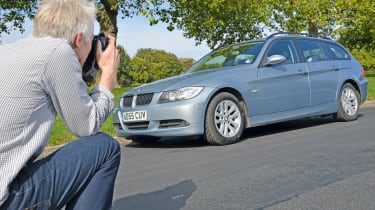
Can you part-exchange a car with outstanding finance?
If you have a car that still has outstanding finance left to pay on it there is still the option to use it in part exchange for a new car. Not all car dealers will do this but as long as the car is worth more than the finance owed, some can. Your finance company will supply you with a settlement letter that details exactly the amount left owing and this can be the basis for agreeing the deal on a new car with a dealer.
What happens to your old car when you part exchange it?
The car you part exchange for a new one is no longer your problem. You have your new car to drive away in and the part exchange becomes the property of the dealer to try and turn a profit on. How the dealer goes about this will depend on the type of car. The dealer may sell it themselves, sell it to another dealer that’s more specialised in that kind of vehicle or they may send it to auction.
Alternatives to part-exchanging a car
As we’ve indicated above, part exchange is best seen as the easy hassle-free way to dispose of your old car when buying a new one. It’s not generally the way to extract the maximum value from your old car. There are various alternatives to part exchange and each has its pros and cons.
Car buying services
A number of different car buying firms exist online and many promise to beat any part-exchange valuation, without adding much more by way of inconvenience. The typical process is to enter your car’s registration number into the company’s website, detail its condition, then get a representative value for the car. From there you either need to head to a sales location to finalise the deal in person or some companies will send someone to collect the car.
As always, your car’s condition is key to the price you’ll get. Say it’s in excellent condition when it’s got parking dings, and expect to be offered less money than was originally suggested online. Some firms may use minor issues to reduce the actual amount they will pay. While you don’t have to accept these offers, if you need to fund your next car quickly, you may end up with little choice.
Selling privately
Unless you are able to find a friend, relative or colleague to buy your old car from you, you’ll have to sell your car privately by advertising it either online or in a local newspaper with a classified car ad. Alternatively, you could put it in an online auction.
The auction method allows you to set a reserve price, and a bidding war can push the price of your vehicle up very quickly. The catch is that the site will take a cut of the sale price in commission for its own profits, and there’s no guarantee your car will attract bidders.
If the idea of an auction doesn’t appeal to you, there are numerous online classified sites out there, although Auto Trader dominates the market.
Many online classified sites will use your car’s registration number to determine its engine size, trim level, tax liabilities, as well as performance and economy figures, although you’ll still need to input its mileage yourself.
Some sites even perform a basic background check on your car, which includes its stolen/write-off/scrappage status. Make sure these are correct (they usually are) and then use the ‘description’ section of the advert to detail:
- Your car’s condition. Be honest, without underselling it
- Service history. Can you prove that your car has been maintained regularly by a reputable garage?
- Any repairs? Again, it’s a good idea to be up front, but not too critical
- Any extras not detailed in the specifications section of the advert
- Number of owners
- Willingness to negotiate on price
Getting a friend to proofread the advert before you send it to the newspaper or upload it online never hurts, and avoid using clichés such as ‘first to see will buy’. Make sure you take some good pictures of the car, too.
Did you know you can sell your car with Auto Express? Get the highest bid from our network of over 5,500 dealers and we'll do the rest. Click here to try Auto Express Sell My Car now...
Find a car with the experts




